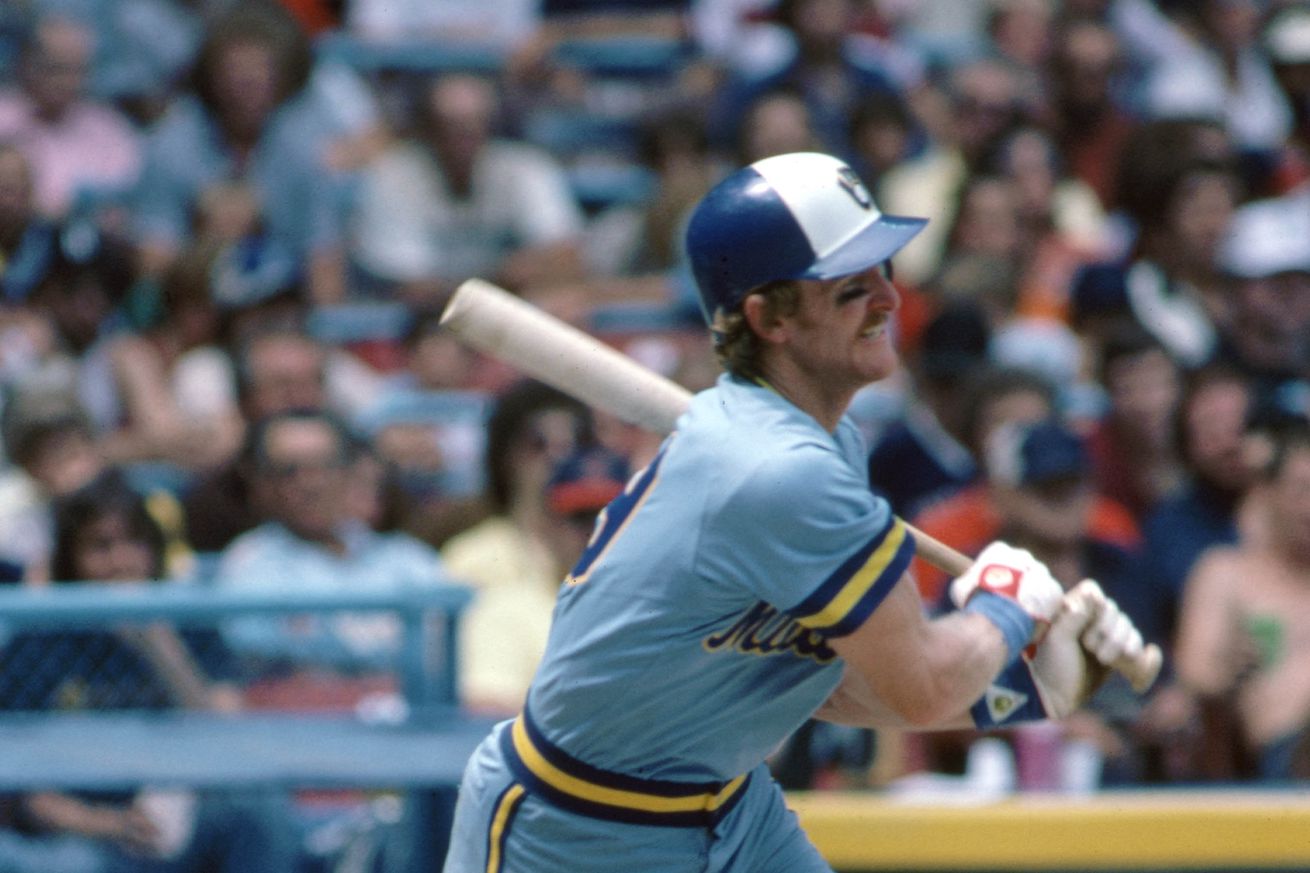
As if there were any question
Today on the Brewers All-Time Team: Shortstop. Have the Brewers ever had a good shortstop? Maybe this one guy? A reminder of our rules:
- We’re looking for the best individual season at each position, not the best career
- Players can only be used once
- A player must have played more games at the given position in the given season than any other position
Review our essays on catcher, first base, second base, and third base. Let’s get to it.
Shortstop: Robin Yount, 1982
156g, .331/.379/.578, 166 OPS+, 46 2B, 12 3B, 29 HR, 114 RBI, 14 SB, 10.6 bWAR, 9.8 fWAR
Robin Yount’s 1982 season is, by a healthy margin, the best season in the history of the franchise. Choosing the best season by a shortstop was not hard. What we did have to weigh, though, was a different question: would this All-Time Team be better served by putting Yount’s other MVP season—1989, when he played center field—in the mix?
No! It wouldn’t be. Yount obviously had a really good season in 1989, but he wasn’t as good offensively that season as he was in 1982, and his defense in center was, by modern estimates, not very good. There are a couple of other very good center field seasons that I’d put ahead of Yount’s 1989 (MVP notwithstanding), but we’ll get to that when we get there.
For now, let’s bask in the glory of Yount’s 1982 season. The Kid had started at an impossibly young age in 1973 and he battled baseball ennui over the first few seasons of his career, so it took a bit for him to become an above-average major leaguer. He had a mini breakout in year four (when he was still only 21) when he approached league-average offense and really got the hang of shortstop from a defensive standpoint. The 1978 season was his first above-average offensive season, and after a step back in 1979, he became a star in 1980, even as the Brewers as a team were somewhat disappointing, with nine fewer wins than they’d had in ‘79.
While Yount had been a very good offensive player in 1980 (when he led the league in doubles, hit 23 homers, and had a 130 OPS+) and a solid one in several other seasons, he ascended to superstardom in 1982. He hit .331/.379/.578 and led the league in doubles again (46) and hits (210) while adding 12 triples and 29 homers, both career highs. Surprisingly, Yount’s .578 slugging percentage and .957 OPS led baseball, quite an accomplishment for a skinny kid who never hit 30 home runs. That season’s home run leaders—Yount’s teammate, Gorman Thomas, and a 36-year-old Reggie Jackson—were both low-speed guys, so Yount led the league in slugging in sort of the way that Ty Cobb used to do it, by hitting for a high average and piling up extra-base hits, even if they weren’t homers.
For good measure, Yount added a Gold Glove, the only one of his career. While modern metrics look back and see him as a better defensive player in 1981, Yount is evaluated as a generally good defensive shortstop for most of the time he spent there before moving to the outfield in 1985, and his Gold Glove win, while perhaps up for some debate, is certainly not a bad decision.
So what do you get when you combine Gold Glove defense at shortstop with a league-leading OPS (and a Silver Slugger)? You get 10.6 WAR, that’s what. Guess how many other seasons by Brewers position players earned 10 WAR? Zero. How about nine WAR? Yes, also zero. What about 8? Oh, yeah, still zero. Yount’s 10.6 WAR in 1982, via Baseball Reference, are nearly three full wins better than any other position player season in the history of the team; second place is Ryan Braun’s MVP season in 2011, when he had 7.7. For fun, here’s a quick list of all the seasons by position players that are worth more than 10.6 bWAR that happened after Babe Ruth retired in 1935 and aren’t by juiced-up Barry Bonds:
- Carl Yastrzemski, 12.5 in 1967
- Cal Ripken Jr., 11.5 in 1991
- Mickey Mantle (twice), 11.3 in 1957 and 11.2 in 1956
- Stan Musial, 11.3 in 1948
- Willie Mays (twice), 11.2 in 1965 and 11 in 1964
- Joe Morgan, 11 in 1975
- Aaron Judge, 10.8 in 2024
- Mookie Betts, 10.7 in 2018
That’s all of them—10 seasons in 90 years, by a who’s who of the greatest players ever. Yount’s season led the Brewers to a 95-67 record, the AL East crown, and the deepest playoff run in franchise history, then he hit .414 with a homer and three doubles in the World Series. Good enough, I think, for the shortstop position on the Brewers All-Time Team.
The choice was obvious, but some of the other best shortstop seasons: Yount in 1983 and 1980, which are the second- and third-best seasons at the position in team history (and his 1984 season might be fourth); my one-time favorite Brewer Bill Hall and his 2006 season, when he came out of nowhere to hit 35 homers and 39 doubles; J.J. Hardy’s 2008, his best season in Milwaukee; Willy Adames’s 2024, though he was probably best as a Brewer in the 99 games after they traded for him in 2021; Pat Listach’s Rookie-of-the-Year campaign in 1992; and José Hernández’s 2002, when he led the league in strikeouts (for the second straight year!) but put up good power numbers and made the All-Star team.
